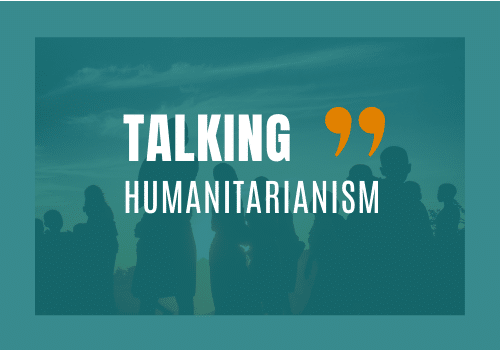Welcome to "Talking Humanitarianism", a podcast by the NCHS bringing you conversations with humanitarian researchers and practitioners.
In this podcast, you will hear from researchers and practitioners who share their findings and reflections on a range of humanitarian issues from migration, conflict and disaster to health and governance.
Access Talking Humanitarianism where you get most of your podcasts, including Spotify and Apple or listen via our website below.
The Talking Humanitarianism podcast series is an initiative of the Research Network on Humanitarian Efforts of the NCHS.
Series 01: Intersecting vulnerabilities in humanitarian disasters
Series 02: Humanitarianism and transitions to a low-carbon future
Episode 09: Humanitarianism in a post-liberal age
Episode 10: Against the humanitarian grain
Series 03: Humanitarianism through the lens of climate resilient development
Episode 15: The ethics of humanitarian neutrality in Syria
Episode 16: Red lines for humanitarian aid in Afghanistan
Episode 17: Principled humanitarian action: Dynamics of good practice
Episode 18: Engaging with the Taliban then and now
Episode 19: Ethics and global distribution of vaccines during Covid-19
Episode 20: Jan Egeland on humanitarian negotiations
Episode 21: Risks and responsibilities in the digital transformation of humanitarian action
Episode 22: Rediscovering humanitarianism through the lens of justice: Roles, responsibilities and rights
Episode 23: Living in a changing climate: Dynamics of forced migration and displacement
Episode 24: Humanitarian diplomacy and multilateral engagement
Reflections from outgoing Permanent Representative of the IFRC to the African Union, Itonde Kakoma in conversation with Dr. Salla Turunen
Episode 25: Life in the ‘new Moria’ refugee camp
Psychologist and fieldworker for Doctors Without Borders, Katrin Glatz Brubakk, in conversation with Heidi Mogstad
Episode 26: The ethics of localisation – Part 1
Episode 27: The ethics of localisation: Part 2 with Arbie Baguios
Episode 28: Education in emergencies: Rethinking, engaging and envisioning pathways
